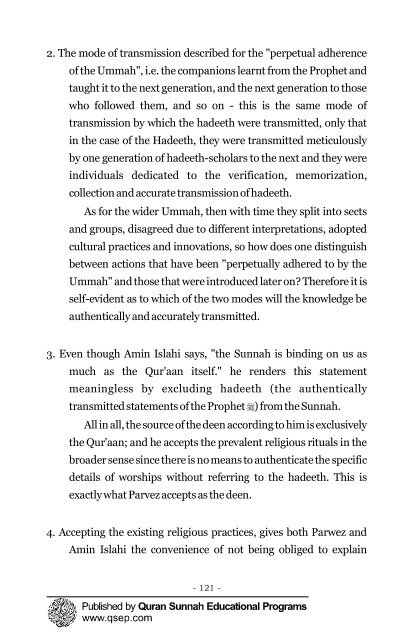A critical analysis of the Modernists and the Hadeeth ... - Islam House
A critical analysis of the Modernists and the Hadeeth ... - Islam House
A critical analysis of the Modernists and the Hadeeth ... - Islam House
Create successful ePaper yourself
Turn your PDF publications into a flip-book with our unique Google optimized e-Paper software.
2. The mode <strong>of</strong> transmission described for <strong>the</strong> "perpetual adherence<br />
<strong>of</strong> <strong>the</strong> Ummah", i.e. <strong>the</strong> companions learnt from <strong>the</strong> Prophet <strong>and</strong><br />
taught it to <strong>the</strong> next generation, <strong>and</strong> <strong>the</strong> next generation to those<br />
who followed <strong>the</strong>m, <strong>and</strong> so on - this is <strong>the</strong> same mode <strong>of</strong><br />
transmission by which <strong>the</strong> hadeeth were transmitted, only that<br />
in <strong>the</strong> case <strong>of</strong> <strong>the</strong> <strong>Hadeeth</strong>, <strong>the</strong>y were transmitted meticulously<br />
by one generation <strong>of</strong> hadeeth-scholars to <strong>the</strong> next <strong>and</strong> <strong>the</strong>y were<br />
individuals dedicated to <strong>the</strong> verification, memorization,<br />
collection <strong>and</strong> accurate transmission <strong>of</strong> hadeeth.<br />
As for <strong>the</strong> wider Ummah, <strong>the</strong>n with time <strong>the</strong>y split into sects<br />
<strong>and</strong> groups, disagreed due to different interpretations, adopted<br />
cultural practices <strong>and</strong> innovations, so how does one distinguish<br />
between actions that have been "perpetually adhered to by <strong>the</strong><br />
Ummah" <strong>and</strong> those that were introduced later on? Therefore it is<br />
self-evident as to which <strong>of</strong> <strong>the</strong> two modes will <strong>the</strong> knowledge be<br />
au<strong>the</strong>ntically <strong>and</strong> accurately transmitted.<br />
3. Even though Amin Islahi says, "<strong>the</strong> Sunnah is binding on us as<br />
much as <strong>the</strong> Qur'aan itself." he renders this statement<br />
meaningless by excluding hadeeth (<strong>the</strong> au<strong>the</strong>ntically<br />
transmitted statements <strong>of</strong> <strong>the</strong> Prophet �)<br />
from <strong>the</strong> Sunnah.<br />
All in all, <strong>the</strong> source <strong>of</strong> <strong>the</strong> deen according to him is exclusively<br />
<strong>the</strong> Qur'aan; <strong>and</strong> he accepts <strong>the</strong> prevalent religious rituals in <strong>the</strong><br />
broader sense since <strong>the</strong>re is no means to au<strong>the</strong>nticate <strong>the</strong> specific<br />
details <strong>of</strong> worships without referring to <strong>the</strong> hadeeth. This is<br />
exactly what Parvez accepts as <strong>the</strong> deen.<br />
4. Accepting <strong>the</strong> existing religious practices, gives both Parwez <strong>and</strong><br />
Amin Islahi <strong>the</strong> convenience <strong>of</strong> not being obliged to explain<br />
- 121 -

















